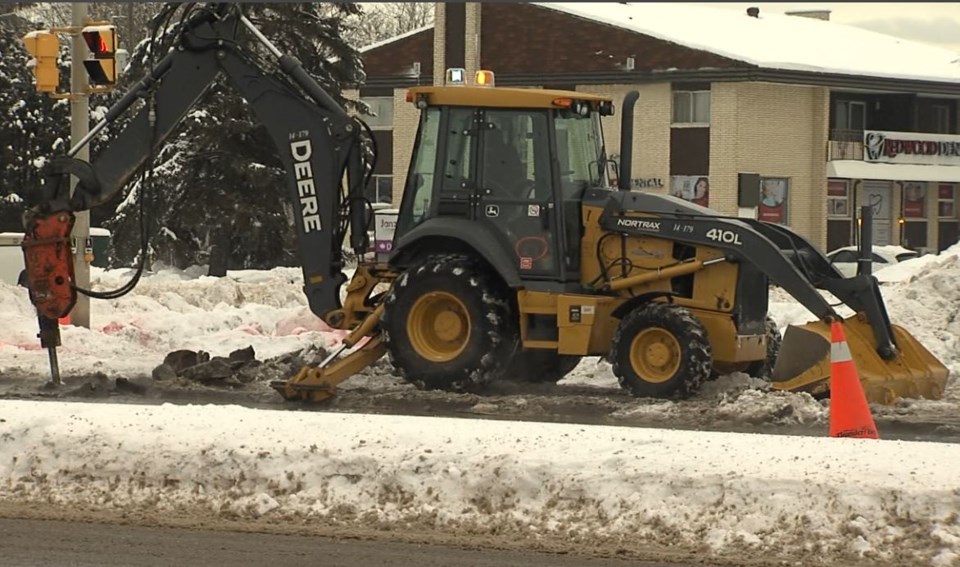In an effort to remove a financial barrier to the public’s health, the city is launching a lead pipe removal incentive program in the third quarter of this year.
Although the city removes what few lead pipes they discover underground as soon as they’re uncovered, the private side of the equation is up to property owners who oftentimes do not replace their lead pipes with a safer material.
Lead was considered an acceptable material in pipes until 1975, and was deemed safe in solder until 1990, according to a report by city water and wastewater professional Cheryl Beam presented to city council last year.
Lead toxicity is now known to cause “reduced cognition, increased blood pressure and renal dysfunction in adults, as well as neurodevelopmental and behavioral effects in children including reductions in intelligence quotient (IQ) scores,” the report says, noting there are no safe levels of lead.
“At this point, we haven’t had a record-keeping system that’s able to quantify the number of lead services currently still in the ground on the private side,” Beam said, adding that despite this, it doesn’t appear to be a “significant issue.”
Even so, the incentive program, which was unanimously approved by city council during 2022 budget deliberations last month, strives to help remove whatever lead pipes remain on private property that are pumping drinking water to Sudburians.
The program will include a grant of up to $3,000 for private service replacement, a loan of up to $10,000 repayable over 10 years and an option for property owners to benefit from both of these incentives.
The city will also provide certified water filters to those at highest risk of lead exposure, including children aged six and younger and pregnant and breastfeeding mothers, to remove lead until their water service lines can be replaced.
The total annual municipal cost for these efforts is approximately $150,000.
In the meantime, Beam said water tests conducted on the city’s side of the water distribution system consistently measure “magnitudes below” the Health Canada limit for lead, which is five parts per billion, and that between zero and five lead pipes are discovered on the public side each year.
When lead pipes are discovered during repairs or capital work, they’re replaced as soon as possible on the city side. When city staff find lead pipes on the private side, either underground or during water readings, the property owner is informed.
The city also maintains a regular corrosion control program that includes the introduction of a polyphosphate chemical into the city’s water distribution system to aid in corrosion control.
Those concerned about potential lead in their water supply can usually apply for a voluntary water sampling through the city, though Beam said the program has been deferred due to pandemic-related concerns and is “a bit of a moving target” at the moment.
Local commercial laboratories can also run water tests.
“As a city, we always recommend that you contact a plumber who can verify that for you if you’re suspicious,” Beam said.
Those with confirmed lead pipes are encouraged to run their water for approximately five minutes prior to use in order to flush them, particularly during times such as the mornings when water has stagnated in the pipes for a long period of time.
People should also purchase NSF (National Sanitation Foundation)-certified plumbing fixtures.
“We have had instances in our volunteer lead testing program where there have been some high lead sample results that have come back that have actually been a result of people using fixtures that have a high content of lead in there,” Beam said.
“We once came across an individual who had purchased a plumbing fixture that had a high content of lead, and when they switched it it was no longer a problem.”
Water filters that people use either as part of jugs or attached to the tap should also be NSF-certified, Beam added.
Despite lead being of concern in some households, Beam said that residents can rest assured that it’s not a generalized problem and that the municipal side of the city’s water distribution system remains well below the Health Canada threshold for lead.
The incentive program, she said, is intended “to make sure nobody slips through the cracks.”
The city plans on reaching out to local media with details on the lead pipe removal program as soon as it becomes available.
Tyler Clarke covers city hall and political affairs for Sudbury.com.
